Logistics
Warehousing & Fulfillment
Transportation
Industries
Technology & Innovations
E-commerce
E-commerce Fulfillment Services
Lease & Maintenance
Semi Trucks
Logistics
E-commerce
Lease & Maintenance
Buy Used Trucks
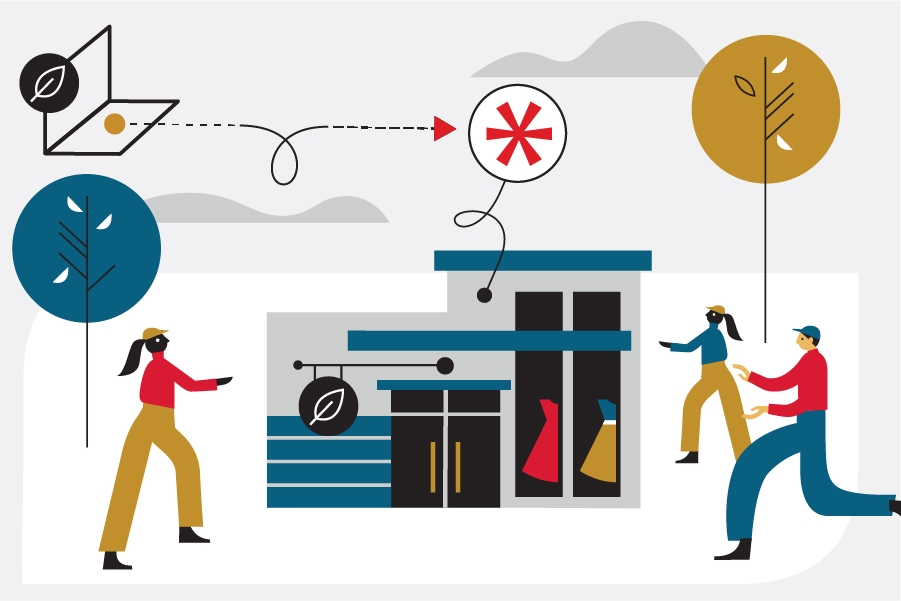
With the pandemic-driven boost of ecommerce businesses, it's hard to imagine shopping anywhere other than on laptops, tablets, and mobile devices. What was originally a necessity during stay-at-home orders has quickly become an expectation for most consumers.
However, as we move into a "new normal" with mask mandates lifting and in-person events occurring once again - consumer trends are changing too. Slowly but surely, brick and mortar is mounting a solid recovery.
What does this mean for online stores? We have some good news - you won't have to drop everything and create an entirely new physical store for your brand. There's another way to dip your toes into the offline retail space.
How? Pop-up shops!
A pop-up shop is a physical retail store that is only open for a short period of time. For digitally-native brands, this type of shop offers a perfect opportunity for trialing a more permanent location with a short-term lease and lower financial risk.
While many pop-up stores often look like regular stores, they often provide more creative or immersive experiences that are designed to introduce both new and existing customers to what makes your brand unique.
The wonderful thing about having a pop-up store is the ability to sell products in a completely controlled environment, fully designed and set up by brands themselves.
Sometimes referred to as "flash retailing," pop-up shops are all about fueling brand interactions through exclusive, limited experiences. The goal is to get your community excited for a different type of connection - in-person!
Essentially, pop-ups enable your customers to "put a face to the name" of their favorite online brand. Instead of chatbots, emails, or phone calls, your brand associates are able to communicate directly with your audience. Most importantly, pop-up stores give brands an opportunity to interact with customers in a unique way while creating a sense of urgency to get in while the pop-up lasts.
While it may seem like unchartered territory, successful pop-up shops have been done time and time again. There's plenty of options to choose from to make sure your customer's experience is exactly what they are looking for.
Similar to your typical brick and mortar shop, a storefront pop-up will have a lease. The difference? It's short-term. This means its a more affordable and less risky business move for your ecommerce store.
Instead of having to pick a location to pay for 2+ years, a shorter commitment will allow your brand to test out the location for a few weeks or months to see how your customers respond before making any long-term decisions.
It never hurts to have virtual options for those customers who can't make in-person events or would rather shop online from the comfort of their own home.
In 2020, Charlotte Tilbury launched a temporary holiday-themed virtual store that included game-like features. Customers were able to browse through virtual 'rooms' while an avatar of the COO guided them. Additionally, the virtual shop brought augmented reality (AR) into the mix with virtual try-ons.
Ever seen an entirely different brand in one of your favorite department stores? This type of pop-up store is called a store within a store (SWAS). It occurs when retailers set aside some space for partnering brands to set up shop.
A SWAS pop-up shop can be done as a permanent or temporary strategy, but ultimately, the goal is to drive more traffic into the store and reach an entirely new audience. Plus, many SWAS arrangements offer some sort of value-add like limited promotions or product sampling to spark excitement and encourage purchasing.
Companies often use pop-up stores to generate buzz around marketing events, like a new product launch, a rebrand, or a company announcement. The key to success with this type of pop-up is making sure you have a clear objective.
If your brand is launching a new product, perhaps allow for samples to be distributed for real-time feedback. If you're rebranding, maybe there's some sort of free swag with your new brand identity for customers to pick up.
This way, your customers don't leave wondering what the point of your event was. If they are able to provide feedback, communicate with your brand representatives, and pick up a few samples or free offerings along the way, they're sure to deem the experience a successful one.
We're not talking about mobile devices - we're talking about stores that are always on the move. Think food trucks, but for your existing store. Mobile pop-up shops are defined as temporary retail space... on wheels!
A mobile pop-up store is an excellent way to reach a broader range of customers. Without being tied to one location like brick and mortar, you'll have the ability to meet your audience right where they are.
Experiential marketing, also known as engagement marketing, is a critical strategy in today's day and age. Why? It invites the audience to interact with a brand in the "real world" and leaves a long-lasting feeling of connection.
If your engaged customers see that you're hosting an event like a pop-up experience, they're likely to not only come but also promote it to others via word-of-mouth (WOM) marketing.
Perhaps one of the most incredible things that pop-up stores can offer brands is flexibility over location. With a temporary space or a mobile store, brands suddenly have the ability to physically follow their customers. Instead of being constrained to a permanent store, they can go right to where the foot traffic is.
It's not uncommon for touristy or wealthier areas to have a large presence of pop-up stores. For example, Aspen has recently experienced an influx of pop-up stores due to its large tourist population and wealthy skiing demographic.
A great way to relax the day after a skiing excursion? Mosey along the streets of Aspen to check out both physical stores and pop-up spaces.
When you're in person with your customers, getting feedback is incredibly easy. Without even speaking to someone, you might know what they're thinking just by their body language, how long they stay in the store, or how interested they are in the products.
While some customers may give feedback right away, others may want some time to think on it - in which case, you can send a quick survey to those who visited.
Either way, pop-up shops present a unique opportunity for seeing your customers' reactions in person, making it a great time to experiment with new products, marketing, or branding.
Without having to commit to a long-term lease and high overheads, pop-up retail gives ecommerce brands the opportunity to trial a location (or two!)
Beauty brand Glossier is no stranger to the idea of hosting temporary shops and SWAS locations in different cities during pre-pandemic times. In fact, many of their permanent retail spaces originally started out as experiential, temporary pop-up shops.
Before opening a permanent location in London, Glossier's pre-pandemic pop-up had an extremely successful reception, welcoming over 100,000 visitors in only 10 weeks. Becoming the highest source of offline sales, fans speculated whether they'd make the move to open up a flagship store. Spoiler alert! They did:
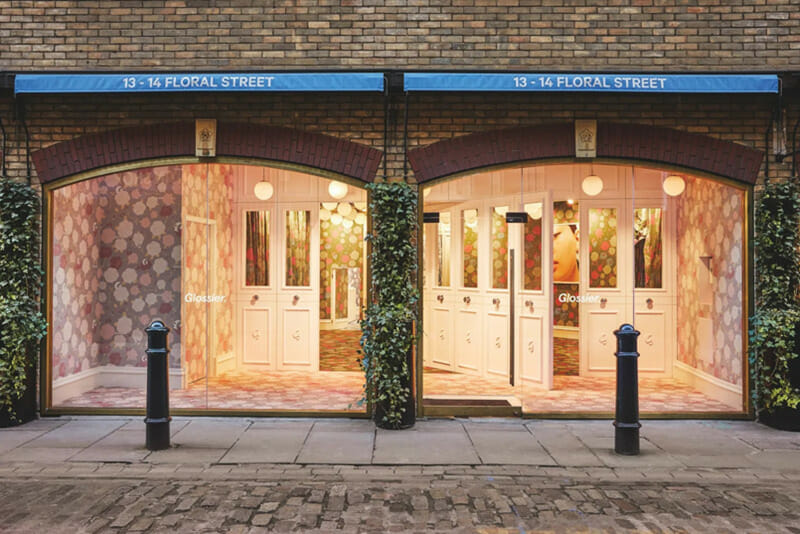
Even with the digital boom, there's no escaping the curse of D2C retail - acquisition always becomes more expensive over time.
Why? Because those easy-to-convert customers have already done their online shopping and growth becomes stagnant.
While digital marketing will always need plenty of budgeting resources, by investing in experiential marketing like a pop-up shop allows ecommerce businesses to offer an alternative channel to both their existing and new customers.
Plus, it's a wonderful way to bring in new audiences who are just beginning their customer journey (and more likely to make an online purchase after a positive in-person experience!)
Whether your goal is to promote a new product, create stronger customer relationships, or revamp your entire brand, your pop-up shop will certainly need a clear objective. Without one, your customers may find themselves wandering into an incohesive experience.
Given that customer experiences play the largest role in helping ecommerce brands stand out from the crowd (even above produce and price), a unique pop-up space has the ability to attract customers with a fun alternative to shopping online or at a traditional store.
A successful pop-up shop will be aesthetically pleasing and on-brand while offering something exclusive or new - something that your customers won't get from simply shopping online.
Finding the best location and venue for your pop-up shop is dependent upon your audience, budget, and overall goal. Perhaps you want to set up shop in retail locations where you know your customers will be based on the product or vertical. Or, perhaps you build immersive experiences within various shopping malls to test where your customers are more likely to shop. Whatever you decide on, you need to make sure that your pop-up concept will support your goals.
The phrase, "if you build it, they will come" doesn't exactly work well for pop-up shop venues. You may interest a few passersby, but if your audience doesn't know about your short-term pop-up, how will they ever make their way to its physical location?
Having an in-depth marketing strategy will help generate a buzz around your store and keep a flow of interested consumers coming in to see what you have to offer. Working with local influencers, posting teasers on social media, creating a site-specific hashtag for visitors to use, and sending press releases to local and online publications can create excitement while getting the word out about your pop-up launch.
It's one thing to communicate with a customer you've never met in person, it's an entirely different thing to communicate with a customer who has just put a face to your brand's name in a physical space.
Having face-to-face conversations with your customers, seeing their reactions and what they're posting or taking pictures of is the best way to interact, get feedback, and have a better sense of what they need and want from your brand.
With your brand's name fresh in their minds, it doesn't hurt to send a post-event social media survey or email to give them a chance to have some say in your future pop-up store initiatives.
As we mentioned above, successful pop-ups offer something different that shoppers can't find online. Whether it's free samples, exclusive products, or discounts, you'll want to make sure there's an incentive for your customers to purchase directly while exploring the space. This way, your temporary pop-up shop isn't taking traffic away from your online store; rather, it's an entirely separate channel to engage your customers with.
If it's done well, your pop-up store can encourage potential customers to check out your online shop... as long as they liked what they saw in person!
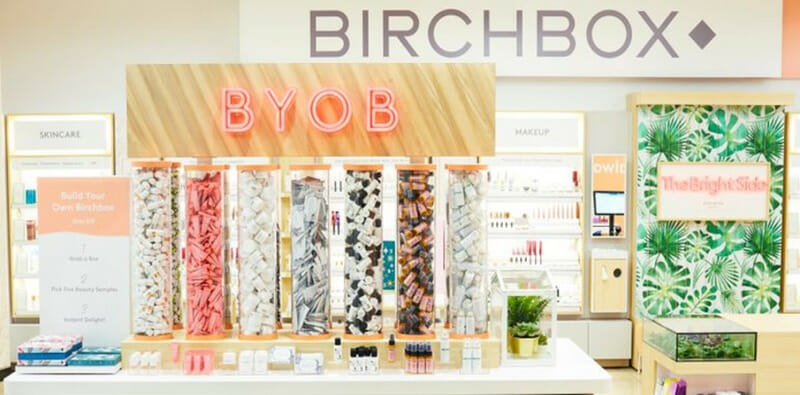
During 2019's holiday season, Birchbox opened up 500 shop-in-shops in Walgreen locations across the country. In a "build your own box" fashion, the pop-up featured smaller, travel-size (or stocking stuffer-sized!) items that customers could grab and go.
What Birchbox is doing right: Birchbox chose a specific focus on smaller items that holiday shoppers may already have their eyes on for stocking stuffers or last-minute gift ideas. Plus, they reached a much wider audience by placing themselves in high-traffic, popular convenience stores.
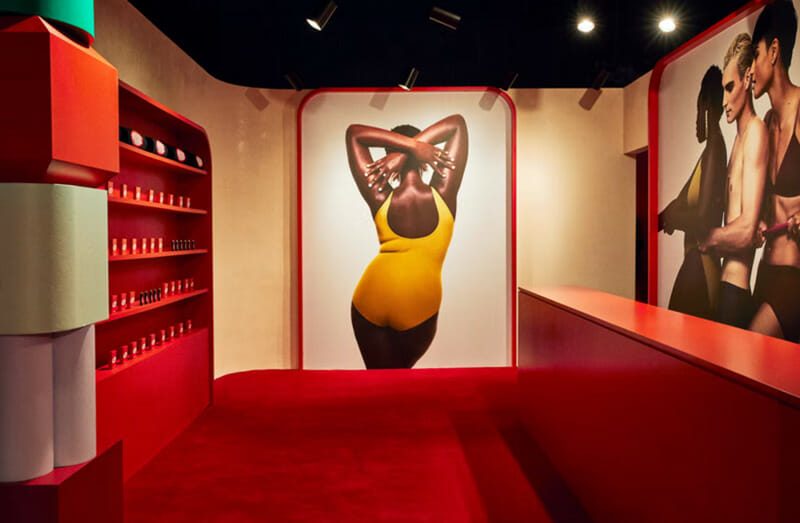
In August of 2021, popular Gen-Z intimates brand Parade tested out its first-ever in-person retail experience in Manhattan, New York. The shop included Instagram-worthy decorations to highlight their latest "Summer Daisy" collection, refreshments, and more.
What Parade is doing right: Parade took customer connection through events to another level. After a successful run with their ecommerce site, they decided to go all-in on in-person experiences, building out a 3-day itinerary consisting of events like dance parties in Brooklyn - right where many of their followers are.
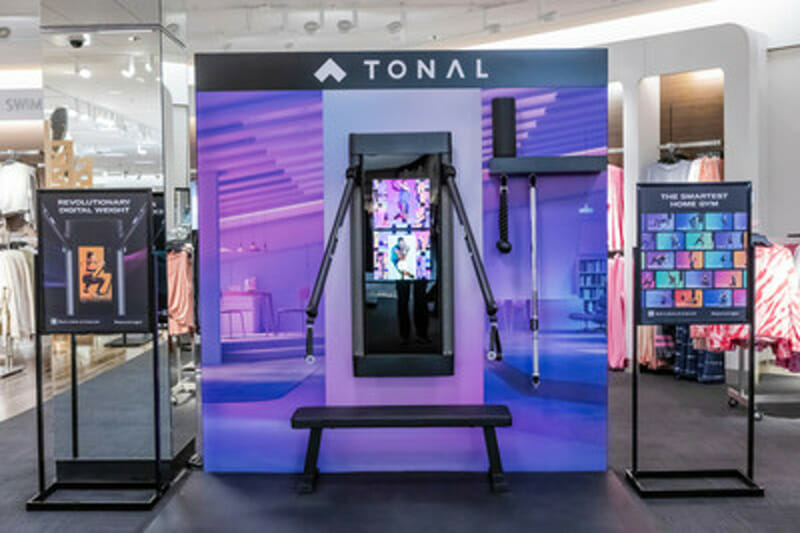
Last year, Tonal partnered with Nordstrom to set up space for customers to check out their wall-mounted fitness machine in person. With a full experience of the device before any payment, customers are less likely to hesitate when making that final purchase.
What Nordstrom x Tonal is doing right: With such a high-value product, it's no surprise that consumers are itching to try Tonal before they buy. Each mini shop allows anyone who's interested to test out Tonal and experience a workout demo - with a Tonal rep right there to answer any questions.
Ultimately, you know your audience best!
Reach out to your customers to see if they’d be interested in an event like a temporary pop-up store. Create social media surveys, send an email or an SMS – your community will be grateful that you’re looking for ways to improve and grow together.
No matter what your goal is for your pop-up (trialing long term locations, meeting shoppers face-to-face, promoting a new product or brand) – it will create a distinctive advantage: an in-person, “real life” experience that your customers will hold onto long after their visit.